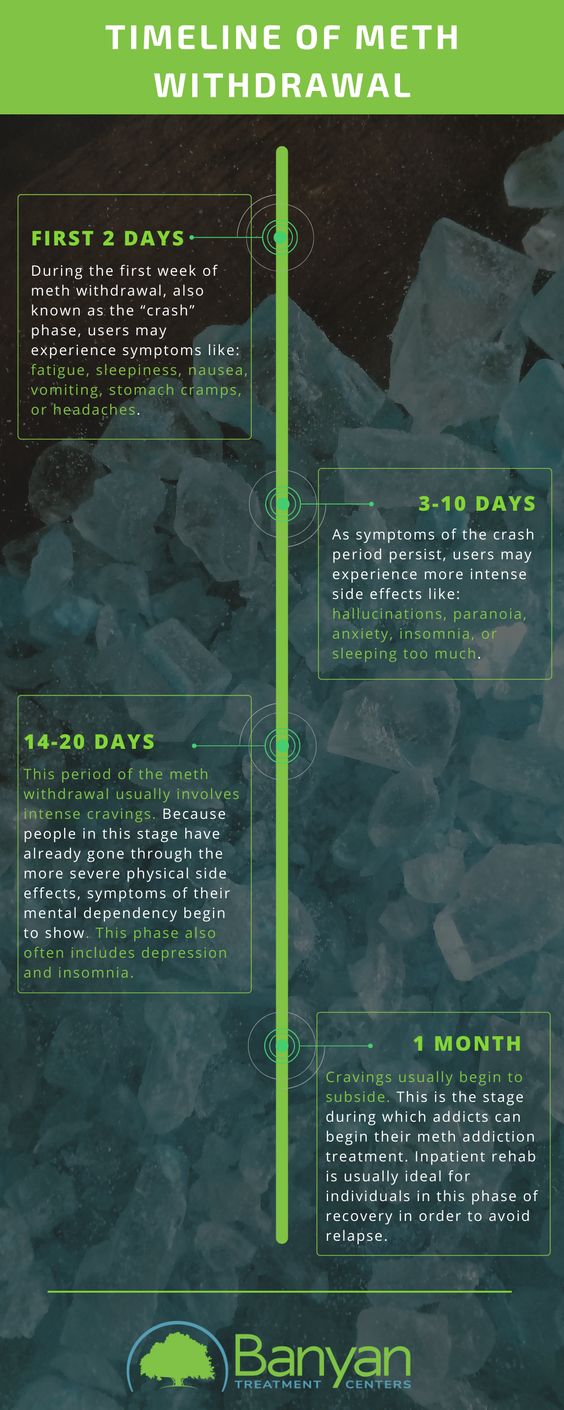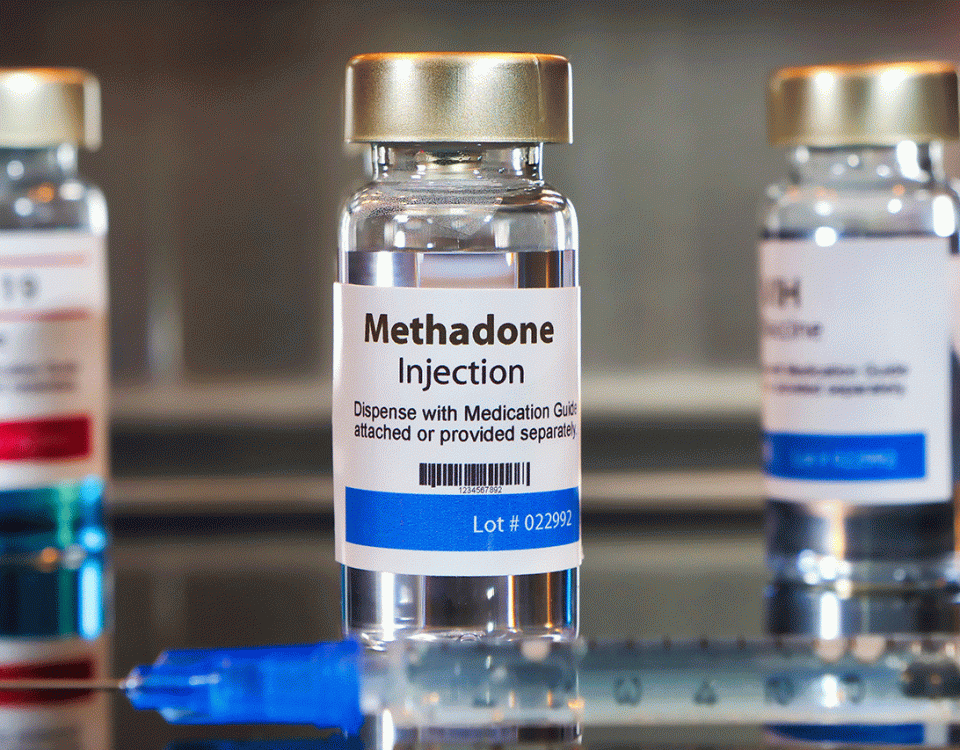Methamphetamine is a dangerous and highly addictive stimulant that’s known for causing numerous health problems, including meth mouth and meth mites.
Its effects on the central nervous system can quickly cause severe addiction, making it difficult for users to quit. When people with meth addictions attempt to stop cold turkey, they may experience severe meth withdrawal symptoms. Although the meth withdrawal timeline and the severity of symptoms depend on different factors, this process can be painful and life-threatening without medical assistance. At our Texas rehab centers, we offer a variety of addiction treatments and programs that offer round-the-clock care to our patients.
The Timeline of Meth Withdrawal
Withdrawing from meth is usually an uncomfortable experience. The signs and symptoms of methamphetamine withdrawal can show as early as 24 hours after the person’s last dose. Because meth causes the brain to release an excessive amount of dopamine, early symptoms include overwhelming feelings of fatigue and sadness. With a proper meth detox like the one we offer at Banyan Treatment Centers Texas, addicts can safely withdraw from meth and begin their recovery.
Some additional withdrawal symptoms of meth include:
- Anxiety
- Fatigue
- Sleepiness
- Headaches
- Confusion
- Hallucinations
- Inability to sleep or sleeping too much
- Depression
- Cravings
- Increased appetite
These symptoms may occur at different phases of methamphetamine withdrawal. The severity and longevity of these side effects may depend on the person’s health condition and the severity of their addiction. In other words, the longer their use, the worse their symptoms may be. Below is a timeline of meth withdrawal symptoms.
First 2 Days
This is perhaps the most intense phase of the process. Medical supervision during this time is crucial to manage these symptoms and ensure the safety and well-being of the individual going through withdrawal. During the first week of meth withdrawal, also known as the “crash” phase, users may experience symptoms like:
- Decline in energy
- Fatigue
- Sleepiness
- Nausea
- Vomiting
- Stomach cramps
- Headaches
3 to 10 Days
While this phase can still be challenging, many individuals start to see some improvement in their symptoms. Medical supervision during this time is still important to ensure that any symptoms are managed effectively and that the individual receives the necessary support to continue their recovery. It's essential to remember that everyone's experience with meth withdrawal is different, and symptoms may persist beyond the first ten days. Therefore, ongoing medical treatment and support are necessary to maintain sobriety and prevent relapse. As symptoms of the crash period persist, users may experience more intense side effects like:
- Hallucinations
- Paranoia
- Anxiety
- Inability to sleep or sleeping too much
14 to 20 Days
This next period of the meth withdrawal timeline usually involves intense cravings. Because people in this stage have already gone through the more severe physical side effects, symptoms of their mental dependency begin to show. No longer distracted by their physical symptoms, users are back to craving the intense high they felt while using. This phase also often includes depression and insomnia.
1 Month
Around the 30-day mark, cravings usually begin to subside. This is the stage during which addicts can begin their meth addiction treatment. Inpatient rehab is usually ideal for individuals in this phase of recovery to avoid relapse. Potential triggers that exist at home can prevent the person from progressing in their treatment. This stage can last up to 4 or 5 months, so the longer the person stays away from meth, the easier it’ll be for them to sustain their sobriety.
Can You Die From Meth Withdrawal?
Although methamphetamine withdrawal is usually not lethal in and of itself, it can cause extremely unpleasant physical and psychological side effects that could seriously jeopardize one's health. When someone stops using meth suddenly, they can get really tired, have strong cravings, feel depressed or anxious, and eat more. Sometimes, the psychological discomfort brought on by withdrawal might result in suicidal thoughts, which, if ignored, can be fatal.
In addition, the physical toll that withdrawal takes on the body—which includes problems like malnutrition, dehydration, and heart problems—can exacerbate pre-existing medical conditions and lead to more health problems. Although methamphetamine withdrawal is not intrinsically fatal, the difficulties and hazards involved emphasize how crucial it is to get expert medical and psychological support at this crucial stage to control symptoms and reduce potential consequences.
Can I Detox From Drugs at Home?
Detoxing from drugs at home is not a recommended approach, especially for substances such as methamphetamine. Methamphetamine is an addictive stimulant that can cause intense cravings and severe withdrawal symptoms, such as depression, anxiety, psychosis, and suicidal thoughts. Medical supervision during meth detox is critical to managing these symptoms and avoiding complications, including life-threatening ones.
Professional medical assistance is essential during meth detox. Medication-assisted treatment (MAT) can be used to manage withdrawal symptoms and prevent relapse by employing medications like buprenorphine to reduce cravings and alleviate withdrawal symptoms. Medical professionals can also monitor patients' vital signs and provide necessary support during the detox process. Trying to detox from meth at home can be perilous and even fatal, especially for individuals with underlying health conditions or a severe addiction history.
Seeking professional medical assistance and support from the meth detox program at our rehab in Texas is vital for ensuring a safe and effective recovery. Through means like meditation, medication assistance, and emotional support, patients have the chance to reclaim their lives.
The Meth Recovery Timeline
Embarking on the journey to recover from methamphetamine addiction involves a challenging process that unfolds over a distinct timeline. While individual experiences may vary, a general meth recovery timeline can provide insight into the stages and milestones of this transformative journey.
The recovery meth timeline can include:
- Detoxification (days 1 to 14):
- The initial phase involves the body's detoxification process as individuals cease methamphetamine use. This period may be marked by intense cravings, fatigue, mood swings, and sleep disturbances.
- Medical supervision during detox is crucial to manage withdrawal symptoms and ensure the individual's physical well-being.
- Early recovery (weeks 2 to 12):
- As the body adjusts to the absence of meth, psychological symptoms such as depression and anxiety may persist, necessitating therapeutic support.
- Establishing a structured routine, engaging in counseling, and building a support network become pivotal during this phase.
- Mid-stage recovery (months 3 to 6):
- Cognitive and emotional recovery continues, with individuals gaining more stability and clarity.
- Ongoing therapy, participation in support groups, and addressing underlying issues contribute to sustained progress.
- Maintaining sobriety (months 6 to 12 and beyond):
- Continued therapeutic support is essential as individuals navigate potential triggers and challenges in daily life.
- Developing coping mechanisms, practicing relapse prevention strategies, and building a healthy lifestyle contribute to long-term recovery.
Starting a methamphetamine recovery journey is a complex process that calls for dedication, tenacity, and continuous assistance. Understanding the steps in the meth recovery timeline enables people to prepare for obstacles, acknowledge their successes, and strive for long-term well-being after the initial periods of withdrawal. A robust support network and expert advice are essential for assisting patients through every phase of their rehabilitation process, building resilience, and bringing about long-lasting, constructive change.
If you or a loved one is struggling with withdrawal from meth, get help now. Attempting to quit on your own can put you at risk of more severe health problems. Call Banyan today at 888-280-4763 to learn more about our Texas rehab programs.










